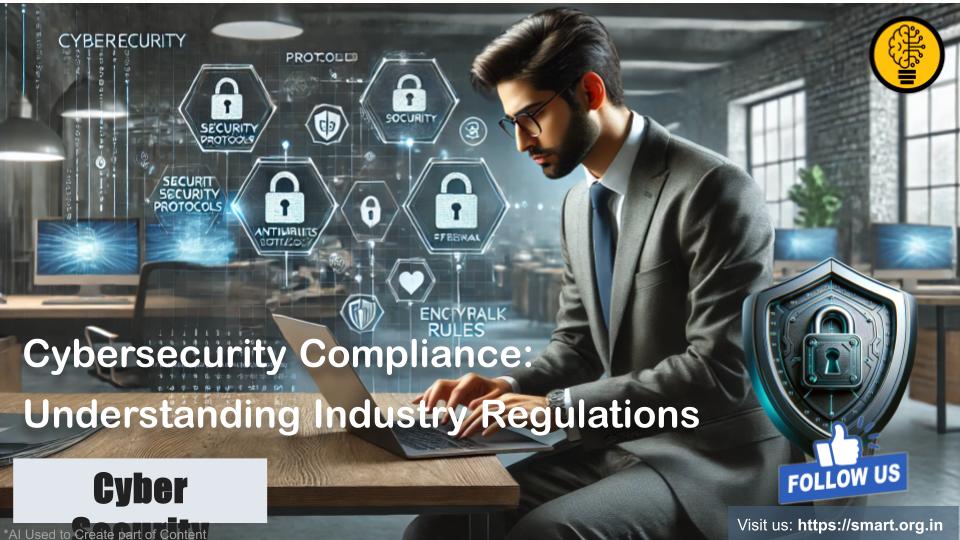In today’s digital landscape, cybersecurity compliance is not just a best practice; it is a necessity. As cyber threats continue to evolve, industries worldwide have established regulations to ensure businesses protect sensitive information and maintain secure operations. Understanding and adhering to these regulations is critical for avoiding legal repercussions, maintaining customer trust, and securing your business. This blog explores the essentials of cybersecurity compliance, highlights key industry regulations, and demonstrates how Smart Group India’s cybersecurity consultancy services can help startups and corporates implement robust cloud security.
The Importance of Cybersecurity Compliance
Cybersecurity compliance involves adhering to rules, standards, and guidelines designed to protect digital information. These regulations help businesses mitigate risks and ensure data privacy and security.
- Legal Requirements: Avoid hefty fines and legal actions by complying with relevant laws.
- Customer Trust: Enhance trust and credibility by protecting customer data.
- Risk Management: Identify and manage security risks proactively.
- Competitive Advantage: Differentiate your business with strong security practices.
Key Industry Regulations
Various industries have specific regulations to ensure the security of sensitive information. Here are some critical ones:
General Data Protection Regulation (GDPR)
GDPR is a comprehensive data protection regulation implemented by the European Union to safeguard personal data.
- Scope: Applies to all businesses processing EU citizens’ data, regardless of location.
- Key Requirements: Obtain consent for data processing, ensure data portability, and report breaches within 72 hours.
- Penalties: Non-compliance can result in fines up to 4% of annual global turnover or €20 million, whichever is higher.
Health Insurance Portability and Accountability Act (HIPAA)
HIPAA sets standards for protecting sensitive patient information in the healthcare industry.
- Scope: Applies to healthcare providers, insurers, and any entity handling protected health information (PHI).
- Key Requirements: Implement safeguards for data privacy and security, conduct regular risk assessments, and provide training.
- Penalties: Fines range from $100 to $50,000 per violation, with an annual maximum of $1.5 million.
Payment Card Industry Data Security Standard (PCI DSS)
PCI DSS is a global standard aimed at securing credit card transactions and protecting cardholder data.
- Scope: Applies to all entities involved in storing, processing, or transmitting credit card information.
- Key Requirements: Maintain secure systems and applications, encrypt cardholder data, and implement strong access control measures.
- Penalties: Non-compliance can result in fines ranging from $5,000 to $100,000 per month.
Sarbanes-Oxley Act (SOX)
SOX is designed to protect investors by improving the accuracy and reliability of corporate disclosures.
- Scope: Applies to publicly traded companies in the United States.
- Key Requirements: Implement internal controls and procedures for financial reporting, conduct regular audits, and ensure data accuracy.
- Penalties: Severe penalties for non-compliance, including fines and imprisonment.
Steps to Achieve Cybersecurity Compliance
Achieving cybersecurity compliance involves several critical steps. Here’s a guide to help businesses navigate the process:
Conduct a Risk Assessment
Understand your organization’s vulnerabilities and identify potential threats.
- Identify Assets: Catalog all data and systems.
- Assess Risks: Determine the likelihood and impact of various threats.
- Prioritize: Focus on high-risk areas first.
Implement Security Measures
Put in place the necessary controls to mitigate identified risks.
- Access Controls: Restrict access to sensitive information.
- Encryption: Protect data at rest and in transit.
- Regular Updates: Keep systems and software up to date.
Develop Policies and Procedures
Establish clear guidelines for data handling and security practices.
- Data Protection Policy: Define how data is collected, stored, and processed.
- Incident Response Plan: Outline steps to take in case of a security breach.
- Employee Training: Educate staff on cybersecurity best practices.
Monitor and Audit
Regularly review and audit your security measures to ensure ongoing compliance.
- Continuous Monitoring: Implement tools to monitor network activity.
- Regular Audits: Conduct internal and external audits to evaluate compliance.
- Update Practices: Adjust policies and procedures based on audit findings.
Smart Group India’s Role in Cybersecurity Compliance
Navigating the complexities of cybersecurity compliance can be challenging. Smart Group India offers specialized consultancy services to help businesses implement robust cloud security and achieve compliance with industry regulations.
- Expert Consultancy: Provides tailored advice based on your specific needs.
- Cloud Security: Implements advanced security measures to protect data in the cloud.
- End-to-End Solutions: Offers comprehensive services from risk assessment to monitoring and auditing.
- Training and Support: Ensures your team is equipped with the knowledge and tools to maintain compliance.
Cybersecurity compliance is a critical aspect of modern business operations. Understanding and adhering to industry regulations not only protects your organization from legal repercussions but also builds customer trust and strengthens your security posture. By following a structured approach to compliance and leveraging the expertise of consultancy services like Smart Group India, businesses can confidently navigate the complexities of cybersecurity and safeguard their valuable data. In an increasingly digital world, prioritizing cybersecurity compliance is not just a necessity; it is a strategic advantage.


In conclusion, we at Smart Group hope this article has provided you with valuable insights and actionable strategies. Smart Group India Incubation provides a nurturing environment for startups, offering comprehensive support and resources to foster growth and innovation. With access to expert mentorship, state-of-the-art infrastructure, and networking opportunities, startups can thrive in their journey from ideation to market launch. Explore our services in DevOps consultancy, IoT solutions, and cybersecurity to leverage cutting-edge technology for your business success. Join us to embark on a transformative journey towards entrepreneurial excellence. For further information and a deeper dive into this topic, we encourage you to explore the following resources. These links offer a wealth of knowledge and expert opinions that can enhance your understanding and assist you in applying these concepts effectively.
Startup Policies Govt. Of India
Startup News Sites
Publications
Research Papers